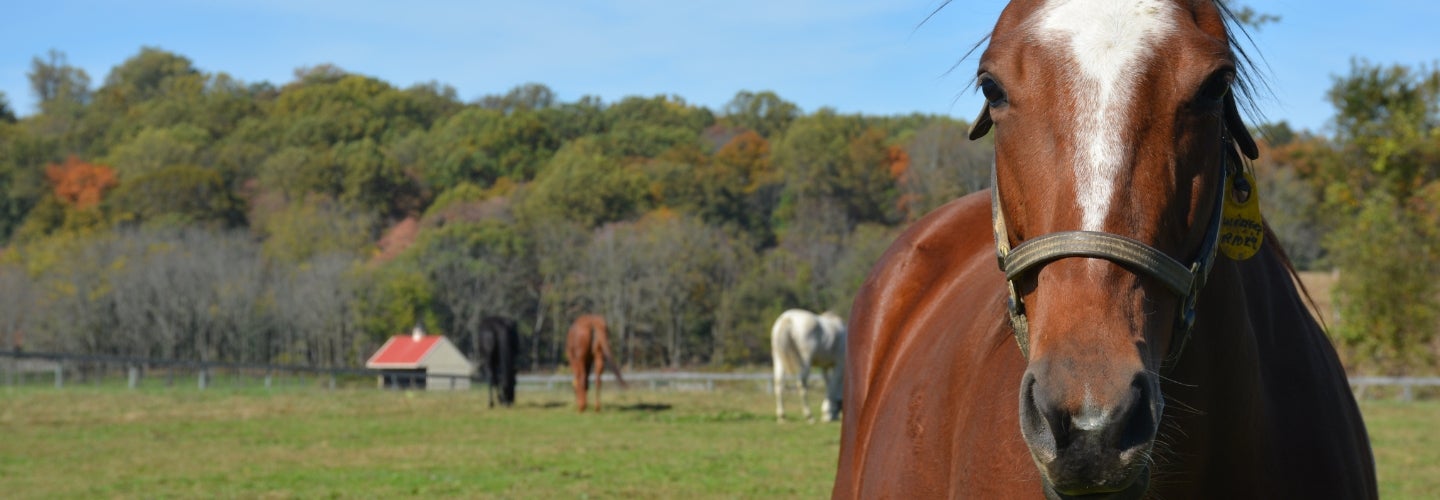
Reproduction
What we do
Breeding soundness evaluations, reproductive diagnostics, infertility treatment, breeding management and advanced reproductive techniques are provided at the Georgia and Philip Hofmann Center for Animal Reproduction by a team of three board-certified veterinary reproduction specialists and a board-certified behaviorist.
Our Reproduction Services
The Georgia and Philip Hofmann Center is on approximately 25 acres and located one mile southwest on the New Bolton Center campus, and can house horses, cattle and small ruminants. Facilities are available for semen collection. A state of the art laboratory facilitates excellent semen analysis, semen packaging for transport and semen freezing, embryo processing for direct transfer or transport. Examination stocks and ultrasounds enhance examinations.
Mare Services
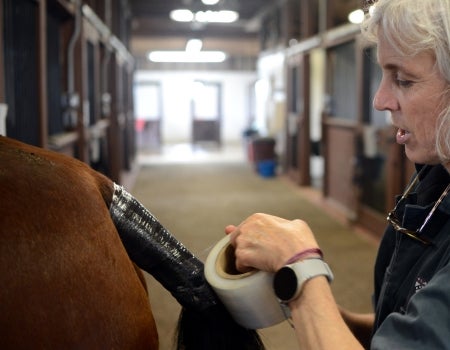
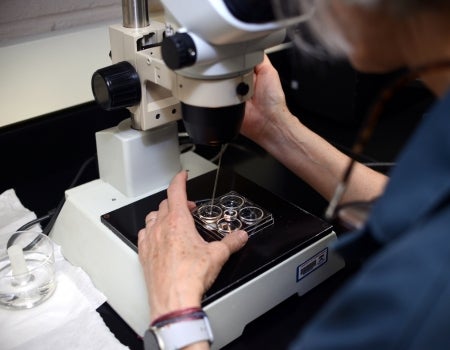
The Georgia and Philip Hofmann Center for Animal Reproduction provides a wide range of mare services.
- The Hofmann Center offers a Breeding Soundness Evaluation or fertility work-up for mares to determine if there are problems that may be associated with infertility.
- The package includes:
- Palpation and ultrasonographic evaluation of the mare’s reproductive tract per rectum
- Uterine culture
- Uterine cytology
- Uterine biopsy
- Manual, digital evaluation of the cervix
- Vaginal speculum examination
- For those mares requiring additional diagnostics, we also offer hysteroscopy, low volume uterine lavage with culture and cytology, endocrine testing and cytogenetic analysis.
- If you are interested in a fertility work-up for your mare, please contact our reproduction team today by calling 610-925-6364.
- The Hofmann Center offers breeding packages for mares being inseminated with fresh, chilled or frozen semen. The packages include all necessary transrectal ultrasonographic examinations and artificial inseminations. Board, medications and other treatments (ie. uterine lavage, uterine infusions) are additional.
- Mares managed for frozen-semen breedings are carefully monitored throughout the daytime and evening hours and are inseminated via deep uterine horn insemination, timed carefully to coincide with ovulation. All mares, including those with foals, receive personalized care including daily individual turnout in large outdoor paddocks.
- The Hofmann Center offers a wide variety of other reproduction services to mare owners including:
- Pregnancy diagnosis
- Fetal sex determination
- Manual twin pregnancy reduction
- Medical treatment of blockled oviducts
- Transvaginal twin pregnancy reduction
- Treatment of uterine infections (bacterial and fungal)
- Endometrial biopsy interpretation (in conjunction with the Pennsylvania Animal Diagnostic Laboratory System, PADLS).
- If you are interested in submitting an equine endometrial biopsy for processing and interpretation, please fill out the Endometrial Biopsy Submission Form (PDF), and contact PADLS Mammalian Pathology Lab for more information, fees, and timeline for results.
- In conjunction with our Board-certified surgeons, internists and imaging specialists, we also offer:
- Surgery to improve mare perineal conformation
- Evaluation of mid- and late-term pregnancies
- Diagnosis and treatment of uterine and ovarian tumors
- Uterine cyst removal
- Cervical laceration repair
- Ovariectomy
- Foaling packages for high-risk mares
- Laparoscopic treatment of blocked oviducts
Assisted Reproduction Services
Stallion Services
The Hofmann Center offers stallion semen collection services. The center boasts a spacious breeding shed with rubber flooring, hydraulically adjustable breeding mount, experienced stallion handlers and fully equipped laboratory for semen analysis and processing. Semen can be collected from your stallion while he is mounted on a breeding mount or mare.
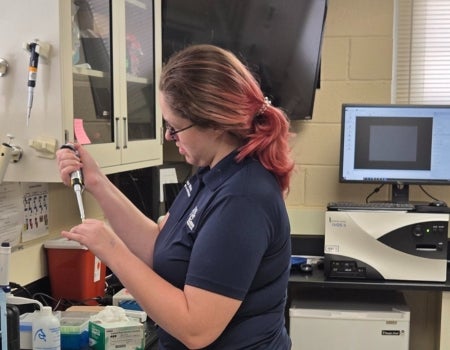
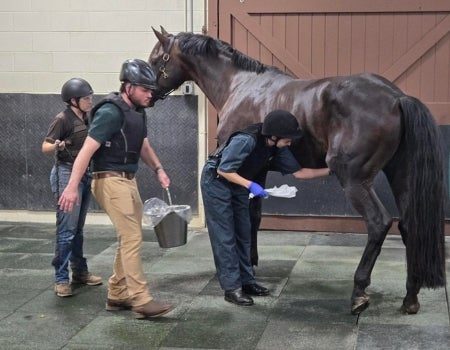
We also are happy to manage both mares and stallions for natural service when needed.
Our team specializes in alternative methods of semen collection such as ground semen collection and pharmacologically-induced semen collection.
These techniques can prove invaluable when managing disabled stallions or stallions that, for other reasons, cannot have semen collected by standard means.
All semen undergoes a complete analysis by one of our veterinary specialists, including computer-assisted evaluation of sperm motility, prior to packaging and shipment.
If you are considering the purchase of a breeding stallion, if you have a stallion whose fertility is uncertain, or if you are retiring a performance horse to a breeding career, the Hofmann Center offers a wide range of fertility evaluations designed to fit your needs – from simple semen evaluations to complete fertility workups including the most advanced semen analysis tests and testicular imaging.
We routinely work with stallions breeding only a few mares to stallions breeding hundreds of mares each year and we are happy to put together an evaluation that will most accurately allow us to assess your stallion’s potential fertility.
Semen collection and packaging for transport are available by appointment Monday – Friday between 9 AM and 3 PM. Semen is collected and analyzed by veterinary specialists before packaging and shipping. Transport containers are available for rental and disposable transport containers are available for purchase. Hofmann Center will use UPS unless an alternate courier is requested. Hofmann Center will not be liable for any delays or damage that occurs during shipping that results in a damaged or unbreedable dose. It is the owner’s responsibility to request insurance if the courier offers insurance for fresh/frozen semen.
To book a collection, contact the team at (610) 925-6364.
The Hofmann Center offers training services for stallion semen collection. The center boasts a spacious breeding shed with rubber flooring, experienced stallion handlers, board certified reproduction specialists and stimulus mares (ovariectomized and mares in natural estrus).
Our experienced team can train your novice stallion to mount the breeding mount or stimulus mare for semen collection in an artificial vagina. We also can introduce novice stallions to live cover using our seasoned mares.
In addition, we provide training for semen collection on the ground (“ground collection”) and specialize in assisting problem stallions.
The Hofmann Center offers semen freezing services. The center boasts a spacious breeding shed with rubber flooring, experienced stallion handlers, board certified reproduction specialists, reproductive laboratory and stimulus mares.
Both before and after freezing, a careful semen analysis is performed, including computer-assisted sperm motility analysis, evaluation of sperm morphology, and fluorescence-based sperm cell counting.
An automated freezer is available to more carefully control the freezing process. Frozen semen can be stored at the Hofmann Center for a quarterly fee. Transport containers are available for rent if frozen semen needs to be transported to another facility.
In addition to routine semen freezing, the Hofmann Center also offers epididymal semen freezing. Epididymal sperm can be harvested directly from the testicular duct in recently deceased stallions or following castration. This allows for preservation of a valuable stallion’s genetic material, even after unexpected death.
For stallions with fertility problems, our experienced veterinarians can provide not only the best in diagnostic testing, but also management recommendations, and advanced semen processing techniques to maximize pregnancy rates. We can remove ‘toxic’ seminal plasma and even filter semen to remove defective sperm from an ejaculate. Low-dose, deep horn insemination is readily available for mares bred to subfertile stallions with low sperm numbers. For the most severely subfertile animals, sperm can be frozen and made available for intracytoplasmic sperm injection (ICSI).
We also specialize in comprehensive evaluations for stallions with behavioral and ejaculatory problems. A team of experts including our board certified reproduction specialists, board certified equine behaviorist and our experienced stallion handlers will work together to find a solution to your stallion’s problems. Having your stallion evaluated with us allows for a ‘whole horse’ approach to the problem and access to all the state-of-the-art facilities available at New Bolton Center. Together with our board certified imaging specialists, surgeons and internists, we can design a customized, comprehensive evaluation plan for your stallion designed to identify even subtle problems that can adversely affect reproductive function.
Food & Fiber Animal Services
The Hofmann Center offers a wide variety of fertility services for food and fiber animals:
- Bull breeding soundness evaluations
- Ram breeding soundness evaluations
- Buck breeding soundness evaluation
- Female camelid breeding soundness evaluations
Our reproduction clinicians also collaborate with the other board certified specialists at New Bolton Center to evaluate male, female and pregnant food and fiber animals that present to the hospital for illnesses and injuries related to the reproductive tract.
Equine Behavior Clinic
Our Equine Behavior Program and Laboratory at New Bolton Center has grown from within the Section of Reproductive Studies. Since the early 1980s, the program has had research as its core activity. The program has included involvement in related clinical and teaching in the veterinary school and continuing education programs nationally and internationally.
We offer telephone consultations, appointments at our facility or your farm. Learn more about the Equine Behavior Short Courses.
- Weaving
- Cribbing
- Pacing
- Headshaking
- Developmental
- Foal Behavior
- Compliance with Management
- Procedures Aggression
- Head-shyness
- Social Grouping and Separation Problems
- Libido
- Erection Ejaculation
- Rowdy Behavior
- Handling Issues
- Breeding Shed Facilities and Design Related to
- Behavior Self-mutilation
- Hyperactive Stereotypes (Weaving, Pacing, Cribbing)
- Mare Foal Interaction Problems
- Estrus Cycle Related Performance Problems
- Stallion Like Behavior in Mares
Forms for Mare and Stallion Procedures
Our Care Team
Clinicians
Residents

Storm Bugh, DVM

Luisa Correa Garza, DVM
Staff
Jess Edstrom
Large Animal Attendant
Carolyn Rosazza
Reproduction Technician/Laboratory Services Assistant
Ben Guessford
Large Animal Attendant
Two or Three-Week Large Animal Clinical Reproduction Rotation
Equine & Farm Animal Focus
This intensive two or three-week rotation provides veterinary students with immersive, hands-on experience in large animal clinical reproduction, with a strong emphasis on equine reproductive medicine. Students will work closely with teaching mares and stallions to gain practical skills and exposure to real-world reproductive techniques.
Key Components of the Rotation:
- Mare and Stallion Management Gain experience managing breeding mares and stallions, including semen collection, processing, and cryopreservation procedures.
- Assisted Reproduction Techniques Participate in oocyte aspiration procedures and work within a state-of-the-art assisted reproduction laboratory. Students will have ample opportunities to observe or assist in embryo flushing and embryo transfer in mares.
- Periparturient Animal Care Assist in the management and treatment of periparturient mares, sheep, goats, and other farm animals, with opportunities for hands-on experience in dystocia management across multiple large animal species.
- Breeding Soundness Evaluations Observe and participate in comprehensive breeding soundness exams on mares, stallions, bulls, and rams, expanding reproductive diagnostic skills across species.
- Clinical Reasoning and Case-Based Learning Engage in case-based labs designed to enhance clinical reasoning. Activities include:
- Focused literature reviews
- Detailed history-taking
- Interpretation of reproductive examinations
- Development of independent treatment plans and reproductive recommendations
This rotation is tailored for students aiming to build a solid foundation in veterinary reproductive medicine, with an emphasis on hands-on learning and critical thinking. Whether your career interests lie in equine practice or farm animal reproduction, this experience is designed to deepen your expertise and confidence in clinical reproductive techniques.
Prior theriogenology coursework or experience is required for this rotation. If you’re interested in participating in our rotation, please email Dr. Tamara Dobbie at tdobbie@upenn.edu.








